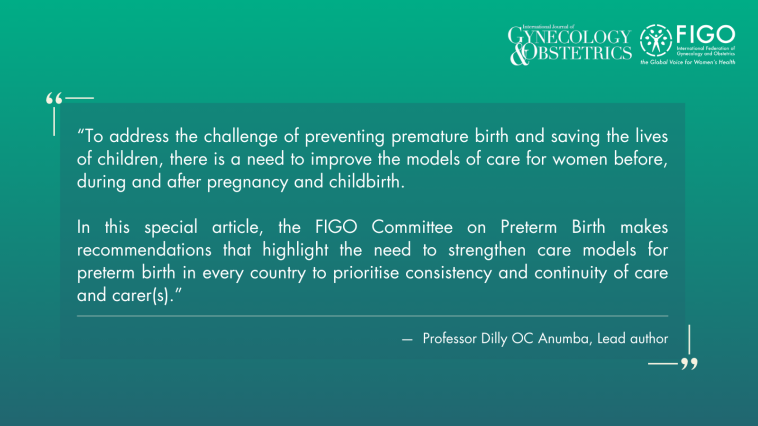IJGO publishes FIGO good practice recommendations to tackle global preterm birth crisis

The International Journal of Gynecology & Obstetrics (IJGO) has published an special article by the FIGO Committee on Preterm Birth titled "Good practice recommendations on optimising models of care for the prevention and mitigation of preterm birth." This pivotal publication addresses the persistent global challenge of preterm birth, a leading cause of neonatal morbidity and mortality.
Preterm birth, affecting 13.4 million babies annually with approximately one million fatalities, has proven resistant to reduction efforts, especially in low- and middle-income countries where health systems are underdeveloped. The FIGO recommendations advocate for improved delivery of respectful, person-centred care using effective models implemented by skilled healthcare professionals.
Key highlights of the recommendations:
- Continuity of care: The recommendations emphasise the importance of continuity of care within existing models, such as midwifery-led and group care, to provide high-quality care across the pregnancy continuum—from preconception to postnatal care.
- Effective interventions: The article underscores the importance of implementing five key interventions to mitigate preterm birth: antenatal maternal steroid administration, magnesium sulfate therapy, delayed cord clamping, early breastfeeding and immediate kangaroo care.
- Context-appropriate models: The authors highlight the need for context-appropriate models of care that can be tailored to different global settings, with a focus on improving maternal and newborn outcomes through integrated and continuous care.
The FIGO Committee on Preterm Birth's practice recommendations aim to integrate continuity into existing care models, ensuring that care is provided by skilled professionals who can deliver evidence-based interventions and develop trusting relationships with patients.
“To address the challenge of preventing premature birth and saving the lives of children, there is a need to improve the models of care for women before, during and after pregnancy and childbirth.
In this special article, the FIGO Committee on Preterm Birth makes recommendations that highlight the need to strengthen care models for preterm birth in every country to prioritise consistency and continuity of care and carer(s).”
— Professor Dilly OC Anumba, Lead author
The article calls for further research to evaluate the effectiveness of these models and their economic implications, particularly in low-resource settings. This research is essential for informing policy and practice, enabling health systems worldwide to implement sustainable changes that improve maternal and newborn health.
With these good practice recommendations, FIGO aims to guide global efforts towards reducing preterm birth rates and improving outcomes for millions of mothers and babies worldwide.
For more information, read the full article in the latest issue of IJGO.